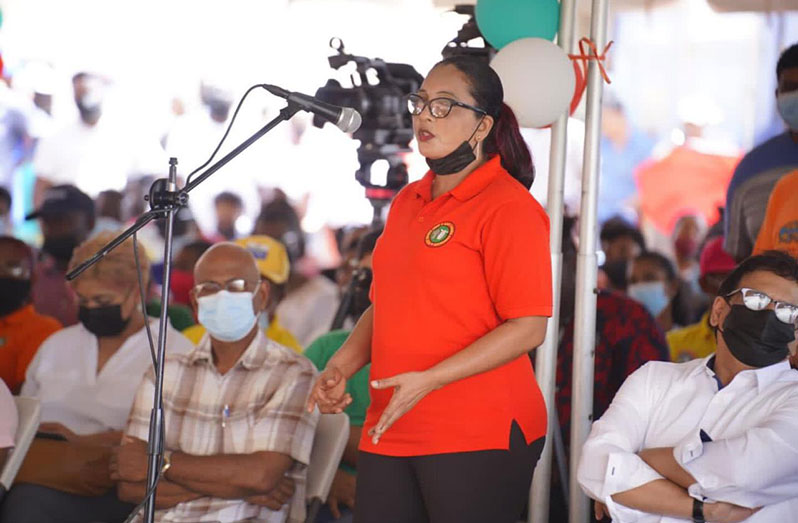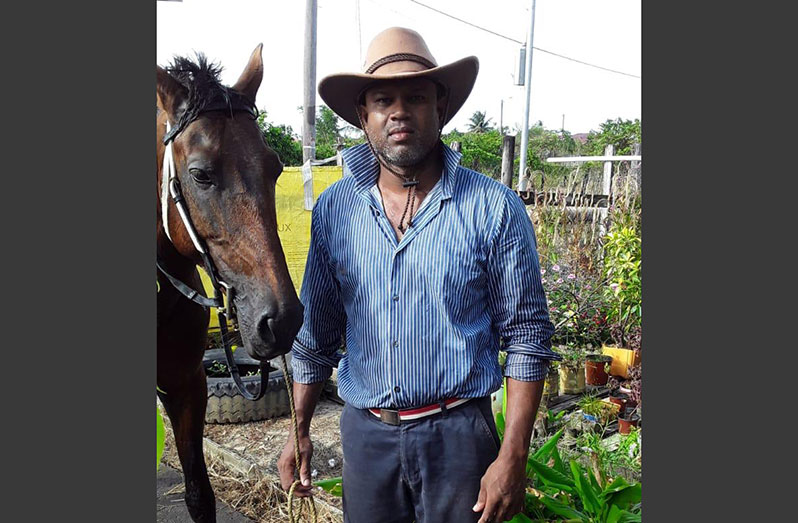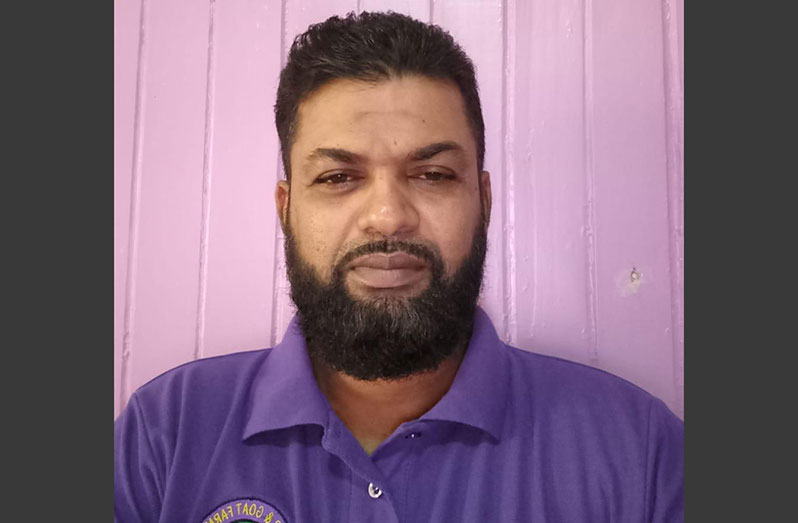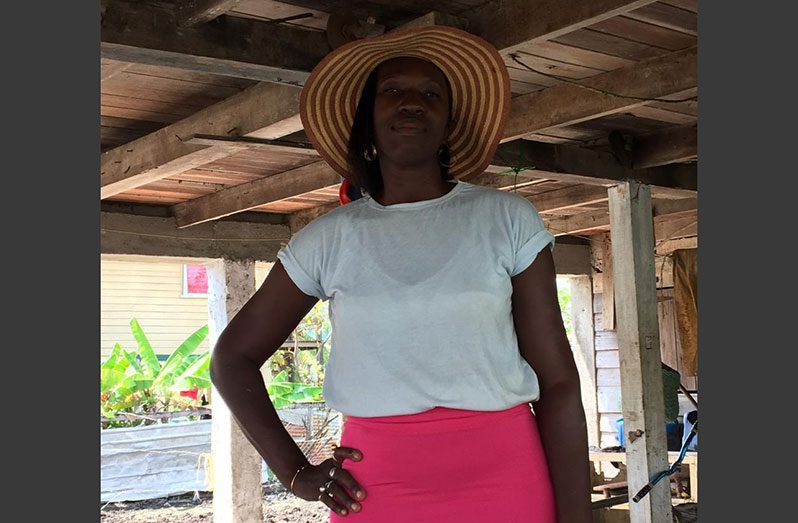–single mother ecstatic about plans to prioritise women, young farmers
–others happy with promise of ‘anti-rustling’ group
LIVESTOCK farmers in Region Five (Mahaica-Berbice) have begun to dream big, now that they have been assured of the unwavering support of President Dr. Irfaan Ali, whose intention is to position the region as the livestock capital of not only Guyana, but also the larger Caribbean Community (CARICOM) as well.
On Sunday, during the launch of a Black Belly Sheep project at Onverwagt, West Coast Berbice, the Head of State delivered a comprehensive presentation on the enormous potential of the livestock industry, underscoring that Region Five has the capacity to supply meats, particularly mutton, to all 15 CARICOM member states.
Dr. Ali was also keen on giving a step-by-step breakdown of how the industry will be developed, and what mechanisms will be put in place to assist farmers, most of whom are in need of access to more land space and better infrastructure, as well as training on the use of innovative and climate-smart technologies.
On Tuesday, the Guyana Chronicle spoke with several farmers who have since begun to envision the eventual evolution of their businesses. Single mother, Yvonne Morris, was the first to express excitement for what is to come.
For over 16 years, rearing farm animals such as cattle, sheep and goats have been her main source of income, enabling her to raise her two children, following the death of their father some time ago.
“I been managing, but it was a little hard; that’s the reason I start doing this business. Is two sons I’m having and things still a little tight but yuh can’t say that yuh deh that bad; yuh gah be thankful for life,” Morris said.
Following the President’s presentation, Morris has allowed herself to imagine life as a large-scale farmer, providing an even better life for her boys.
“This plan that the President got is very good. Its lovely and I am happy. I even studying to go plant a piece of rice,” the Golden Grove, West Coast Berbice resident said candidly.
She was particularly impressed by the specific plans laid out by President Ali, especially as it relates to improving the breeds of the animals, ensuring sufficient access to proper pastures and grasslands, and providing steadier markets for the animals.
“For a start, with the new black belly (sheep) breed coming from Barbados, it will develop the flock, and give us better breed and eventually you gon get better production,” Morris related.
As it relates specifically to the recently launched Black Belly Sheep project, Morris said she was elated to hear the President say that the project will prioritise the participation of women and youths.
President Ali had insisted that at least 20 per cent of farmers in the project have to be women, whilst 35 per cent must have the integral involvement of youths.
Above all, Morris is pleased that Dr. Ali understands the plight of farmers who continue to suffer at the hands of thieves.
“To be honest, that is a tight, tight something,” Morris said, as she recalled several instances where her farm was raided.
“When I did just start, I had 12 sheep, and they tek six. When the sheep drop and get big, they come back and ker eat a next six,” Morris recalled.
She said that during the second raid, the thieves even went as far as to slaughter the family’s dog, which often served as a protection for the woman and her sons.
A SIGH OF RELIEF
In relating the inefficiency of the police when it comes to animal theft, Morris said she was comforted by President Ali’s stance on the issue, and the fact that the police, during Sunday’s launch, was cautioned to do better.
The Commander-In-Chief of the Armed Forces even went as far as to announce the development of a special ‘anti-rustling’ group to tackle issues of animal theft, which continues to plague the Mahaica-Berbice area.
“Security is an important part of the building of any sector or industry,” Dr. Ali assured residents.
With the President’s promise in mind, Morris said she hopes to God that it works out and the President gets through.
She added: “I want it to work out, because I want the thiefin must stop; is young boys doing it. The next thing to, is the butchers we gah get cooperation from….”

As it relates to sick animals, President Ali also informed residents that a second veterinarian will be deployed to effectively serve the region.
Also lauding the government’s efforts was Raian Dhanraj, a farmer of Bath Settlement, West Coast Berbice.
“A lot of people really embrace this initiative,” Dhanraj said, recognising that in order to fulfill President Ali’s vision, farmers as well as members of the Guyana Livestock Development Authority (GLDA), will have “a lot of work to do.”
Dhanraj, a small-scale livestock farmer, is eager to see the development of pastures and grasslands that would allow for “better grazing.”
Also sharing his frustration with animal theft, Dhanraj expressed hope that the oversight group would be outfitted with capable people.
“There’s a lot we have to do, but so far, this is something very good. It will reduce cost of living and so,” the farmer said.
Meanwhile, Debra Gopaul, Head of the Sheep and Goat Association, who has been rearing livestock for over 28 years, said that the Black Belly Sheep project, in particular, was launched at an ideal time, since many are still working to rebuild what they lost during the May 2021 floods, which devastated thousands of acres of farmlands and more than 50,000 households across 300 communities across the country.

She said that with the government’s $7.8 billion flood-relief programme, many families are still working to rebuild and return to optimal production.
“Livestock is my only source of income, and my husband planting rice,” Gopaul said.
She added that President Ali’s position of youth and female involvement in the region’s livestock industry was most pleasing, since it will serve as a notable empowerment mechanism for both demographics.
“For the women especially, this would put more finances in their pockets, rather than have to depend on their husband or anyone else,” Gopaul noted.
She said that having grown up in a family of animal farmers, she understands the role that the industry could play in establishing a young person’s independence.
“I remember in my small days, we does sell we own sheep and buy we school clothes,” Gopaul reflected with a smile.
She is hopeful that since the growth of the region’s livestock industry is a direct policy of the government, law enforcement would be more effective in dealing with reports of animal theft.
“I hope that the vision come through and we have closer collaboration with the police,” Gopaul said.
TRACKING DEVICES
Another farmer named Javed Ishmael of Cotton Tree, West Coast Berbice, is more focused on President Ali’s promise of improved technology, which he believes, could reduce or perhaps even eliminate rustling.
“As you know, we still have larceny, and I know it’s a very complex situation, but I remember speaking with former GLDA boss and he spoke of a chit to track the animals. Farmers will be investing a lot of money, so that would be something nice to see,” Ishmael said.

Like many other farmers, Ishmael too “grew up in the business of livestock farming,” a trade passed down from his great-great-grandfather.
Having heard the President’s promises, he said that he is looking forward to taking his business to next step.
“The hope is to grow from here. One of the reason I didn’t go that far, is because of the need for more investment and guaranteed markets,” the farmer told this newspaper.
He said that now, with the President throwing his support behind the sector, farmers will look to grow and improve on the amount of animals they have.
“Farmers will need all the help we can get; we are looking forward to it…we excited about it,” Ishmael said.
Meanwhile, as far as technology goes, President Ali said, on Sunday, that for the Black Belly Sheep project, each farm will be outfitted with an electronic monitoring system, which will be linked to national database.





.jpg)








